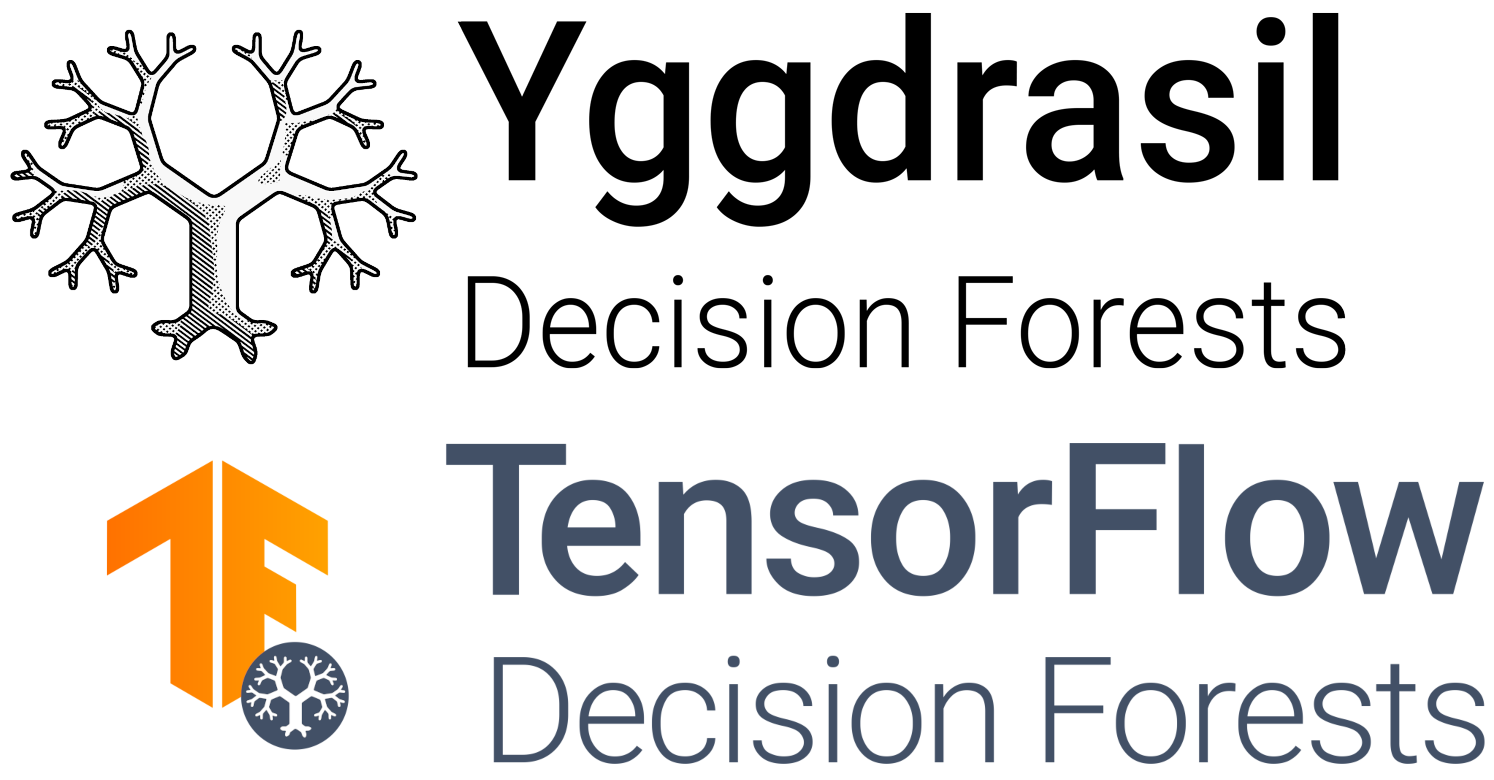Install the CLI API#
This page explains how to install the CLI (Command line interface) of Yggdrasil Decision Forests (YDF). Once installed, models can be trained and evaluated using shell commands.
Pre-compiled binaries#
Linux and Windows pre-compiled binaries are available on the
Github release page.
Look for the files named cli_linux.zip or cli_windows.zip corresponding to
the latest release.
Compile from source#
Instead of downloading pre-compiled binaries, you can compile YDF from the source code.
Requirements#
The following libraries/tools are required to compile YDF.
Bazel or Bazelisk
Python >= 3.8
Git
Python’s numpy
Docker (optional)
Linux or Macos
GCC or Clang. GCC>=9 recommended.
Windows
Microsoft Visual Studio >= 2019
MSYS2
Common#
First, clone the YDF GitHub repository:
git clone https://github.com/google/yggdrasil-decision-forests.git
cd yggdrasil-decision-forests
Then, follow the instructions corresponding to your OS.
On Linux#
Docker makes it easy to compile YDF without caring about dependencies. To build YDF with Docker run the following command:
./tools/build_binary_release_in_docker.sh
Instead, to build YDF without Docker run:
INSTALL_DEPENDENCIES=1 BUILD=1 ./tools/build_binary_release.sh
Building options (e.g., select the compiler, disable support for TensorFlow,
etc.) are available by calling Bazel directly. See tools/test_bazel.sh for
examples. For example, the following command compiles YDF with c++17, AVX2
support and using GCC9.
bazel build //yggdrasil_decision_forests/cli:all \
--config=linux_cpp17 \
--config=linux_avx2 \
--repo_env=CC=gcc-9
On MacOS#
To compile YDF on MacOS, run the following command:
bazel build //yggdrasil_decision_forests/cli:all --config=macos
On Windows#
To compile YDF on Windows, run the following command:
# Set the python path.
# Note: The python path should not contain spaces.
set PYTHON_BIN_PATH=C:\Python38\python.exe
bazel build //yggdrasil_decision_forests/cli:all \
--config=windows_cpp17 \
--config=windows_avx2
If multiple version of Visual Studio are installed on your computer, use the
BAZEL_VC_FULL_VERSION variable to specify the version to use. For example:
# Set a specific version of visual studio.
# The exact version can be found in `Program Files (x86)`
# e.g. C:\Program Files (x86)\Microsoft Visual Studio\2019\Community\VC\Tools\MSVC\14.28.29910.
set BAZEL_VC_FULL_VERSION=14.28.29910
Running a minimal example#
Once the compilation is done, the binaries are available in
bazel-bin/yggdrasil_decision_forests/cli. Those are the same binaries that you
can download in the pre-compiled binaries.
The scripts ./examples/beginner.sh and ./examples/beginner.bat are minimal
examples for Linux/MacOs and Windows.
On linux / MacOS, run:
./examples/beginner.sh
On Windows, run:
examples\beginner.bat
Installing#
Once compiled or downloaded, the YDF binaries can be added to your PATH to make
then easily accessible. For example, instead of typing
bazel-bin/yggdrasil_decision_forests/cli/train, you will type train.
On Linux / MacOS, run:
echo "export PATH=\"$(pwd)/bazel-bin/yggdrasil_decision_forests/cli:\$PATH\"" >> ~/.bashrc
source ~/.bashrc
On Windows:
Run the command
echo %cd%\bazel-bin\yggdrasil_decision_forests\cliGo to Advanced System Settings (Win+Pause) > Environment Variables > path (either in user or system variables) > New and add the result of the command.
TensorFlow support#
YDF can be compiled with or without TensorFlow. Compiling with TensorFlow adds the following features:
Use TensorFlow for all IO operations. Without TensorFlow, IO operations are done using
<filesystem>introduced in C++17 or the experimental filesystem of C++14.Support of TensorFlow Record dataset format.
Note
Compiling without TensorFlow support, GCC 9, is currently (Sept 2023) the only solution to compile YDF with C++14. However, this compatibility might be dropped at time. Compiling the Python port with C++14 is not supported.
To enable TensorFlow support:
Runs:
cp -f WORKSPACE_WITH_TF WORKSPACE
Then, add the following flag to the build command:
--config=use_tensorflow_io
Compile YDF for Raspberry Pi#
Compiling YDF on and for a Raspberry Pi is similar to the Linux compilation with some exceptions:
The Bazel team does not publish pre-compiled binaries for ARM CPUs (the type of CPU used in Raspberry Pi), therefore Bazel needs to be compiled from source on Raspberry Pi. Note that compiling of Bazel takes more time that compiling YDF.
Bazel lacks configuration for Arm processors. We will have to set it manually.
The following instructions have been tested successfully on a Raspberry Pi 4 Model B Rev 1.4.
Install requirements#
On the Raspberry Pi, install GCC and Java JDK:
sudo apt-get update
sudo apt-get install openjdk-8-jdk gcc-8
Compile Bazel#
Detailed instructions and troubleshooting for compiling Bazel on Raspberry Pi is available in the following guides: 1 , 2 , 3 . Refer to them in case of issues.
First, download the source code of Bazel 4:
wget https://github.com/bazelbuild/bazel/releases/download/4.2.2/bazel-4.2.2-dist.zip
unzip bazel-4.2.2-dist.zip -d bazel
Makes the following modifications in the Bazel source code:
In
bazel/tools/cpp/lib_cc_configure.bzl:Around line 180, make the function
get_cpu_valuereturn"arm"independently of its parameters i.e. addreturn "arm"at the top ofget_cpu_value’s body.
In
bazel/tools/cpp/unix_cc_configure.bzl:Around line 392, replace
bazel_linkopts = "-lstdc++:-lm"withbazel_linkopts = "-lstdc++:-lm -latomic".
In
bazel/tools/jdk/BUILD:Around line 142, replace
"//conditions:default": [],with//conditions:default": [":jni_md_header-linux"],.Around line 153, replace
"//conditions:default": [],with"//conditions:default": ["include/linux"],.
Compile Bazel:
cd bazel
EXTRA_BAZEL_ARGS="--host_javabase=@local_jdk//:jdk" bash ./compile.sh
This compilation stage takes a bit less than an hour.
Remember the location of bazel:
BAZEL=$(pwd)/output/bazel
Compile YDF#
Download the YDF source code:
git clone https://github.com/google/yggdrasil-decision-forests.git
cd yggdrasil-decision-forests
Compile YDF:
${BAZEL} build //yggdrasil_decision_forests/cli/...:all \
--config=linux_cpp17 --features=-fully_static_link --host_javabase=@local_jdk//:jdk
Test YDF#
You can run the beginner example that train, evaluate and benchmark the inference speed of a model:
./examples/beginner.sh
At the end of its execution, this script prints the inference speed of the model. For example, on a Raspberry Pi 4 Model B Rev 1.4, I obtained.
batch_size : 100 num_runs : 20
time/example(us) time/batch(us) method
----------------------------------------
12.754 1275.4 GradientBoostedTreesQuickScorerExtended [virtual interface]
20.413 2041.2 GradientBoostedTreesGeneric [virtual interface]
76.803 7680.3 Generic slow engine
----------------------------------------
For comparison, running ./examples/beginner.sh on an Intel Xeon W-2135 returns
the following benchmark:
batch_size : 100 num_runs : 20
time/example(us) time/batch(us) method
----------------------------------------
1.2968 129.68 GradientBoostedTreesQuickScorerExtended [virtual interface]
6.9953 699.52 GradientBoostedTreesGeneric [virtual interface]
16.108 1610.8 Generic slow engine
----------------------------------------
The speed difference is between 3x and 10x.
